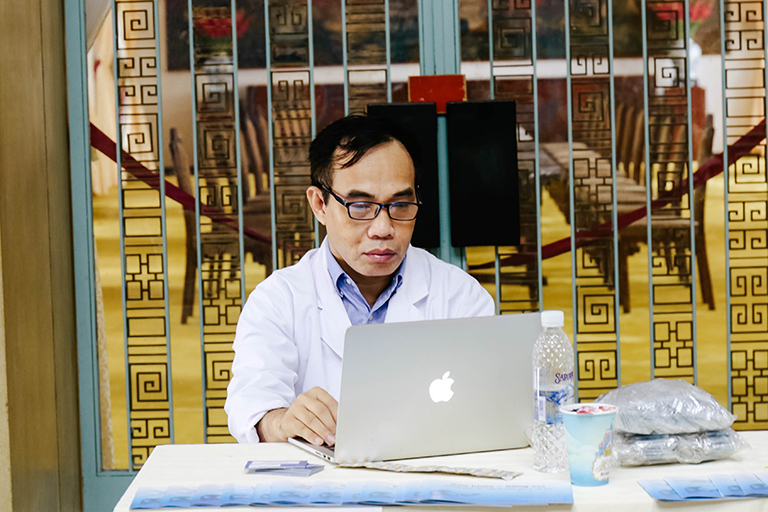Today’s Cold Chain – Connecting The World Of Care
More than 25% of all healthcare industry products are temperature-sensitive. This makes supply chain and logistics a key differentiator for businesses in the sector.
Just like round-the-clock medical care in hospitals, quality cold-chain logistics involves 24/7 support for key clients shipping temperature-sensitive products, many of which have life-changing possibilities. It is crucial that temperature-sensitive packages remain healthy, viable, uninterrupted, and connected to the world as they are vital to the future well-being of all of us.
Megatrends driving growth
The supply and demand for healthcare goods is increasingly global, driven by a combination of emerging economies, longer life expectancy and technological advancements. That is particularly true for the Asia Pacific region which is the new center of gravity for healthcare. According to Bain and Co., Asia Pacific will represent more than 40% of the growth in global healthcare spending over the next decade and this will take place at almost double the rate of other regions.
In East Asia and the Pacific, this older population will grow more than 20% every five years between 2015 and 2034. By 2060, the World Bank predicts one in five of the world’s oldest countries will be in East Asia, compared with just one in 25 in 2010.
In East Asia and the Pacific, this older population will grow more than 20% every five years between 2015 and 2034. By 2060, the World Bank predicts one in five of the world’s oldest countries will be in East Asia, compared with just one in 25 in 2010.

Add to that, this region will also have a larger proportion of the world’s rising middle class. Fuelled by economic growth in emerging markets, the professional services consultancy EY forecasts Asia Pacific will account for two-thirds (3.3 billion people) of the global middle class by 2030, up from just under one-third in 2009.
Another megatrend making an impact on the healthcare sector in the region is hugely advancing technology. This will lead to strong growth in demand for personalized medicine, which customizes care by taking into account patients’ genetic profiles and predictive reactions to treatments. Driven by clinical trials, these highly targeted therapies are expected to dramatically increase the efficiency of treatments and ultimately improve patient outcomes.
Clinical trial logistics is already a key area of investment for FedEx, spurred on by customers who are aggressively expanding in this area. These customers might be medical laboratories shipping test samples for drug research, or pharmaceutical companies and research organizations sending research medicines and supplies to doctors and hospitals across the region.
Besides clinical trial logistics, we’re also seeing increased demand from medical device companies who are moving high-value medical devices and surgical instruments into hospitals and medical centers around the region. Looking further ahead, pharma-biologics is another growth area. This segment needs to ship biological products and materials which require stringent temperature control throughout the supply chain.
Another megatrend making an impact on the healthcare sector in the region is hugely advancing technology. This will lead to strong growth in demand for personalized medicine, which customizes care by taking into account patients’ genetic profiles and predictive reactions to treatments. Driven by clinical trials, these highly targeted therapies are expected to dramatically increase the efficiency of treatments and ultimately improve patient outcomes.
Clinical trial logistics is already a key area of investment for FedEx, spurred on by customers who are aggressively expanding in this area. These customers might be medical laboratories shipping test samples for drug research, or pharmaceutical companies and research organizations sending research medicines and supplies to doctors and hospitals across the region.
Besides clinical trial logistics, we’re also seeing increased demand from medical device companies who are moving high-value medical devices and surgical instruments into hospitals and medical centers around the region. Looking further ahead, pharma-biologics is another growth area. This segment needs to ship biological products and materials which require stringent temperature control throughout the supply chain.
A strategic differentiator and game changer
These potentially life-changing shipments point to why a strong supply chain makes all the difference – it is a strategic differentiator for success in healthcare.
Supply chain optimization results in lower costs which are key to sustaining growth in healthcare. As the current market stands, management consulting company McKinsey estimates supply chain expenses account for almost 25% of pharma costs and more than 40% of medical device costs. So even minor efficiency gains from shorter manufacturing lead times and reduced inventory could free up billions of dollars.
About 25% of all healthcare products are temperature-sensitive and maintaining a specific temperature range throughout the entire shipping process is essential. This makes cold chain logistics a game changer for healthcare as it ensures that lifesaving products remain at their very best and speedily reach their destinations. It’s already having a big impact. The US Department of Commerce estimates the value of healthcare products globally which rely on cold chain at US$130 billion. Data from market research company IMARC Group shows that Asia Pacific healthcare cold chain logistics will post double-digit growth through 2020.
Supply chain optimization results in lower costs which are key to sustaining growth in healthcare. As the current market stands, management consulting company McKinsey estimates supply chain expenses account for almost 25% of pharma costs and more than 40% of medical device costs. So even minor efficiency gains from shorter manufacturing lead times and reduced inventory could free up billions of dollars.
About 25% of all healthcare products are temperature-sensitive and maintaining a specific temperature range throughout the entire shipping process is essential. This makes cold chain logistics a game changer for healthcare as it ensures that lifesaving products remain at their very best and speedily reach their destinations. It’s already having a big impact. The US Department of Commerce estimates the value of healthcare products globally which rely on cold chain at US$130 billion. Data from market research company IMARC Group shows that Asia Pacific healthcare cold chain logistics will post double-digit growth through 2020.
What it means for logistics
All of this opens up huge opportunities for logistics and specialist providers delivering healthcare products and devices. We need high-end solutions from regulatory consulting and global trade management, to temperature-monitoring and enhanced visibility, all aimed at providing healthcare customers with peace of mind, improved profitability and competitive advantage.
Many of these solutions are tailored specifically to customers, taking account of local needs and investing in new technology for the long term. In an industry where healthcare regulations are increasingly complex, overlooking a simple detail can have grave consequences. With the benefit of global networks and expertise, we can help customers stay compliant with import and export regulations around the world.
For instance, we’re working with one customer on faster distribution of clinical kits from Singapore to hospitals in China. We consult with China Customs on import requirements, then consolidate shipments for bulk clearance, and expedite customs clearance in 1-2 days before breaking the shipment down into smaller lots for distribution across China. That has cut lead times from pickup in Singapore to delivery in China from 5-7 days to just 3-4 days, delivering a far better quality of service for clinical investigators. There’s also a trend towards “bundled” solutions where express operators help companies manage their complex supply chains with multi-tiered solutions to meet their cold chain transportation needs.
That is why today’s cold chain is the ultimate game changer for healthcare. A highly efficient, technologically-advanced business – truly connecting the world of care.
Many of these solutions are tailored specifically to customers, taking account of local needs and investing in new technology for the long term. In an industry where healthcare regulations are increasingly complex, overlooking a simple detail can have grave consequences. With the benefit of global networks and expertise, we can help customers stay compliant with import and export regulations around the world.
For instance, we’re working with one customer on faster distribution of clinical kits from Singapore to hospitals in China. We consult with China Customs on import requirements, then consolidate shipments for bulk clearance, and expedite customs clearance in 1-2 days before breaking the shipment down into smaller lots for distribution across China. That has cut lead times from pickup in Singapore to delivery in China from 5-7 days to just 3-4 days, delivering a far better quality of service for clinical investigators. There’s also a trend towards “bundled” solutions where express operators help companies manage their complex supply chains with multi-tiered solutions to meet their cold chain transportation needs.
That is why today’s cold chain is the ultimate game changer for healthcare. A highly efficient, technologically-advanced business – truly connecting the world of care.
***


















 The Latest
The Latest